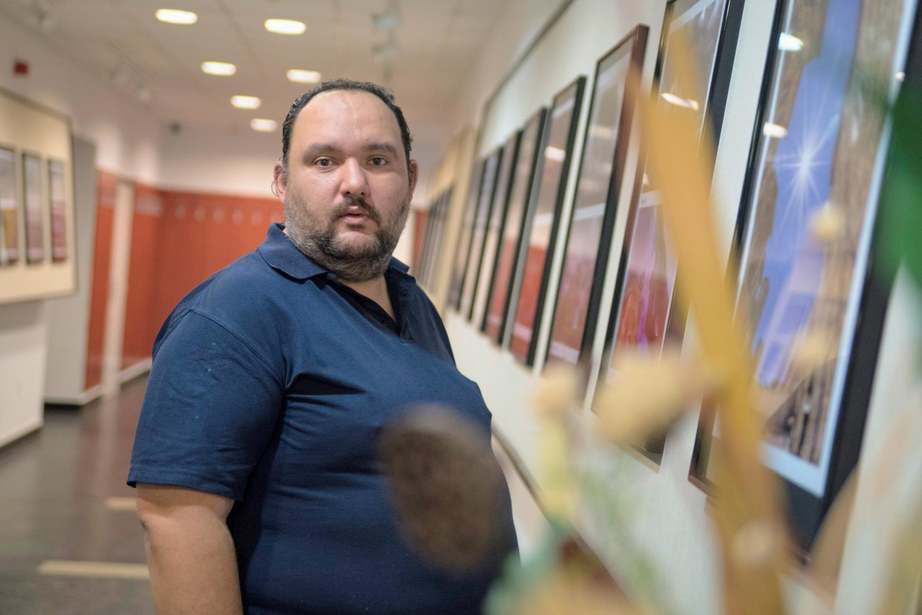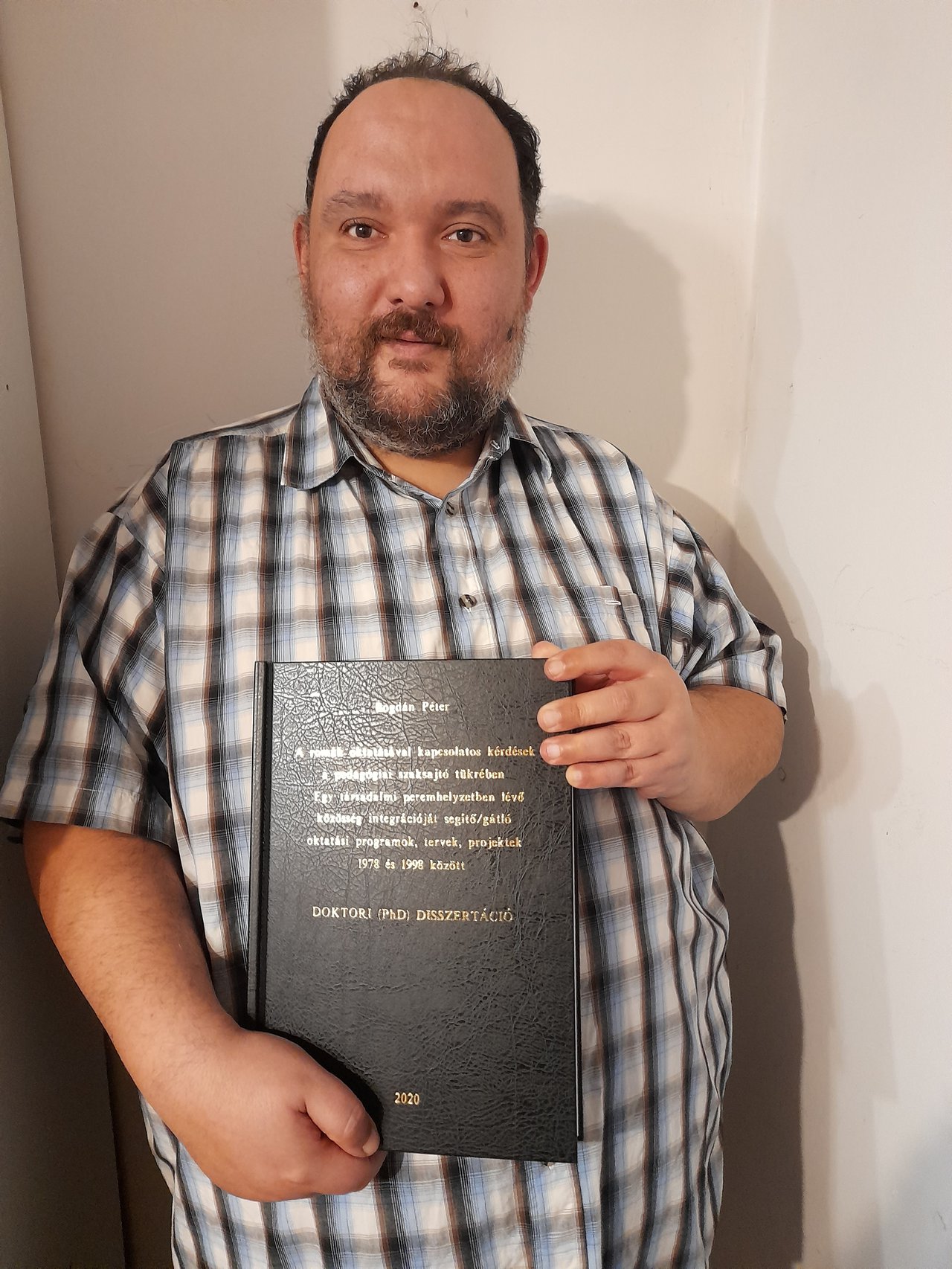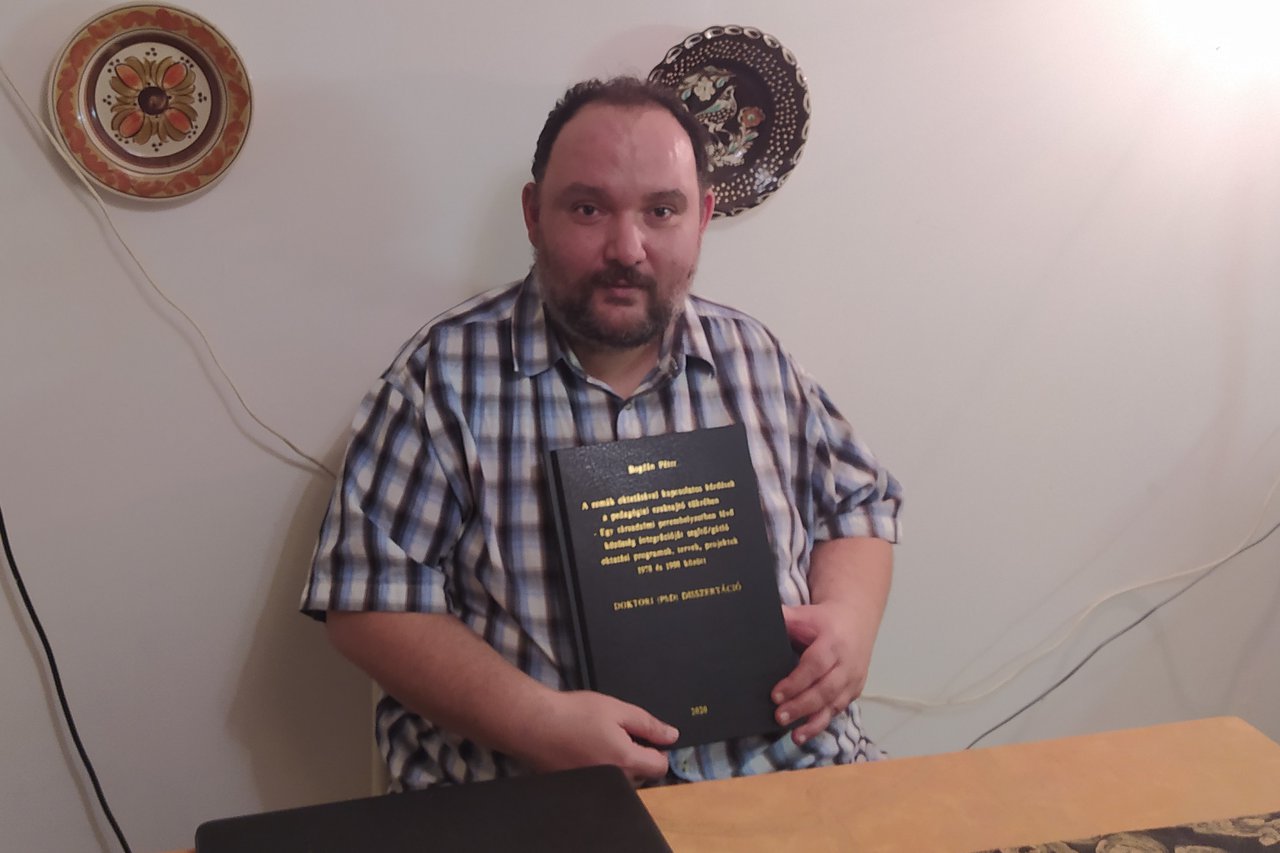Growing up in Bátonyterenye, Hungary, Péter Bogdán lived with an abusive father and a caring mother. As a teenager he already actively participated in the cultural life of Bátonyterenye and later left behind the stereotype of poverty and Roma origins as a researcher and journalist. This process reached its peak quite recenty when he completed his doctoral dissertation, but Péter still has a lot of plans regarding the future. He is enthusiastic about the dialogue between Roma and non-Roma people, and as a teacher he seeks to reform the educational system.

Where do you come from? What kind of family did you grow up in?
I was born in Salgótarján to a very poor Roma family. I’ve spent my childhood in Bátorterenye, Nógrád county. I went to school here too, where I was a member of the choir and a soloist, but also actively participated in the work of the student council. As the cultural coordinator I had the opportunity to edit radio shows and the school magazine. When I was seven, my mother had already registered me in the local childs’ library. I was obsessed with books, especially literature and history which made a huge impact on my life and career even until today.
How did you start working in journalism?
When I was in elementary school social politician Judit Berki, who is also of Roma origins noticed me and took me to journalist camps. We visited the editorial team of the newspaper of Nógrád county, the printing house in Eger and I took a liking in the industry so much, that in high school I started to send a lot of articles to the magazine. I wrote political pamphlets, concert reports a and interviews. Sometimes I wrote the leading article for a magazine, although anonymously under the name of the staff of the newspaper of Nógrád county.
How did you came in contact with academia?
After finishing high school I've met László Trecsényi in the University of Miskolc, who is the president of The Hungarian Pedagogical Association (HPA) and he asked me to write a review of a Roma book on the topic of Art Pedagogy. The article was published in a magazine called Iskolakultúra (School Culture) and soon another one was too about a racist anthology, for which a course was formed in the Eszterházy Károly University. I completed my pre-degree certificate in 2003, but due to my lack of access to a computer it took me two more years to aquire my degree certificate and finish my thesis.

How did you continue?
I applied to the Central European University to the Roma Access Program, which was designed to help preparing the post-graduate studies of Roma students, but I became ill one month before completing the course so I had to leave the institute. That's how I returned to my old love, journalism. I even completed a higher professional certificate in journalism.
Between 2009 and 2011 I was studying at the Doctoral School of Education in ELTE, at the Faculty of Education and Psychology. Due to personal reasons, I had to postpone my scientific work, but after that I was a regular at the National Széchenyi Library for 23 months. I travelled four hours daily and did research for eight hours five times a week. I browsed through around 200.000 pages of pedagogy magazines and found 117 articles useful for my doctoral work.
What kind of research were you working on?
I was curious about research articles about the education of Romas between 1978 and 1997 in ten Hungarian magazines.
Why did your choose this 20-year period?
In 1978 there was a curriculum reform in education, which counts as a border of eras in pedagogy from this perspective. 1997 was the last year before the first official national education plan. I wanted to see if there are differences in emphasis between two political system, the Kádár era and after the system change.
What did your research show?
In the Kádár system the education professionals thought that Roma children need to be segregated. When they didn't succeed they tried to integrate through segregation, which means that they wanted to catch Roma children up to non-Roma students.
So if the leadership of the institute was sure that Roma students reached the level of the white, middle class children the idea of inclusive education was brought up only then. This model failed too and in the mid-80s professionals demanded that it's not integration that is needed, but inter-, and multiculturalism. After the system change more and more pedagogues started to think the same and in 1997 social models replaced the ethnic models.

Did you have any personal reason to research this topic?
I was simply interested. But at the same time I feel like I have to repay my country for the endless number of scholarships I've received. I owe the Roma and non-Roma communities that much, to be the bridge between them. I can think with the head of someone coming from poverty and someone from middle-class too. If I can interpret about Roma educational topics, why wouldn't I do it?
What would be the ideal education system for you?
First of all, we have to forget the Prussian education system. For me, frontal education is unacceptable. I think project-based education and complex instruction programs is important, in which children learn how to be leaders and subordinates as well. Everyone's cooperation is needed for this. It is also important to teach about certain cultures and respect them, the cooperation of children from different cultural backgrounds, to master inclusive views and integration education. The school has to prepare the students for the real social relations, because nowadays we cannot imagine a workplace where Roma and non-Roma wouldn't meet. I would love to see some tanoda models complementing the traditional education programs. For this of course we would need to reform the higher-level education too. I would make at least half-a-year observation mandatory instead of one month in the pedagogy courses and they would have to complete courses about Roma education for four semesters. They would have to learn about the socialization of those coming from poverty and the particularity of cultural differences.
Do you think that we can talk about Roma-specific education?
Ethnic based education does not exist, but we can talk about the psychology of childhood. Every normal child goes through this no matter what language they speak a what kind of cultural background they come from. A child will always be a child.
What do you think about the Roma Mission’s inclusive school program financed by the Swiss partners?
I like the construction, especially their strive for inclusive views. I was always interested in the alternative education exercises. I will pay more attention to them in the future.
What does the title Dr. mean to you?
Many congratulated that I've achieved it and I think with this title I was able to leave the disadvantages from my origin behind. As I said before,I want to serve my country and my,- Roma and non-Roma people - and if my doctoral title helps me with that, then I am happy.
Do you have plans for the future?
I am working as a teacher and professional leader at the tanoda in Budaörs. I am also working in the Institute for Minority Studies at Eötvös Loránd Center for Social Sciences as an associate colleague. In the latter I'm participatig in research, which examines what kind of sacrifices first generation intellectual Romas have to make to succeed. I'm working on a study in which 30 intellectual Romas are introducing themselves and I would like to publish my doctoral thesis as a book too. I am also the PI of the Tom Lantos Institute, where we were researching Roma representations on public spaces with my colleagues. In 2019 we were looking through the capital and last year we did it in the whole country. This year we would like to make our results available to the public as a book and a website.
What is on your bucketlist regarding the far future?
I would like to live in England or in New York, but my wife wishes to go to Italy, so I will learn Italian
Translated by Csenge Kiss
Proofread by Claire Weihe